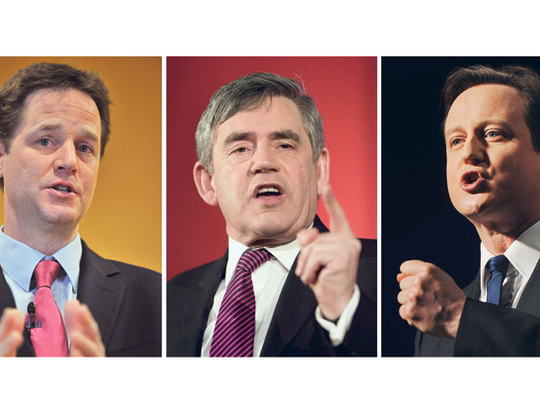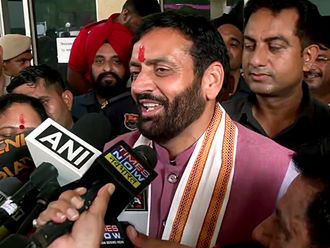
The king is dead. He is no longer merely sick, glum, moody, a bit off colour. He is no more. Gordon Brown should be told, it is time to stop breathing.
The kingmaker tried to tell him on Friday. The Liberal Democrat leader, Nick Clegg, proffered the hardly radical opinion that the party that wins most votes and gets most seats should have the first go at running the country. It is called, er, democracy. He went on: "It is now for the Conservative party to prove that it is capable of seeking to govern in the national interest." He implied that he would support it in that goal.
Instead, we must witness that ritual of all hung parliaments, the ceremony of the courting of the minorities. In their rival suits for Liberal Democrat affection, Brown and the Conservative party leader David Cameron on Friday offered a study in contrasts. It was like the casket test in The Merchant of Venice.
A tired and distracted Brown declared his belief, passionately shared with the Lib Dems, in sound money and political reform. He tossed in a death-bed conversion to "far-reaching political reform, including changes to the voting system". He gabbled out a jumble of "urgent legislation", a fairer franchise and a referendum, in no particular order. Thus did Margaret Thatcher suddenly discover the virtues of academic freedom as she approached her demise.
Cameron came on stage all swaggering seduction. He produced a bouquet of "reassurances" to beguile his Liberal Democrat adored ones. While covering his party posterior on Europe, immigration and defence, he went far further than most observers expected. He professed a symbiosis with Liberal Democracy on debt relief, economics, taxation, pupil premiums, carbon capture and, to no one's surprise, political reform.
Courtship
He appeared to enjoy nothing more than spend long evenings, feet up by the fire, digesting great slabs of Liberal Democrat manifesto. In his relationship with Clegg he promised he would go beyond something "that simply keeps a minority Conservative government in office". I would hazard that Cameron and Clegg are about to fall — briefly — in love.
There is no constitutional objection to Brown struggling to hold on to office, as a predecessor, Edward Heath, did in 1974. It may cost him and his party their dignity, and reinforce his reputation as a bad loser. His pre-emptive pig-in-the-poke offer of a referendum to Clegg was a blatant trap. It would tempt the Liberal Democrat leader into propping up his corpse — with no guarantee of a route to a larger presence for his party in the Commons — while forcing him to share the blame for a new and horrifying round of public spending cuts. Nor did Brown even murmur a suggestion that he might make way for a different leader. And all this would be a preamble to an early return to the ballot, at which Clegg's party would be massacred for aiding him.
Cameron's offer puts Clegg in a different bind. The Liberal Democrats are in just the position their strategists have game-played for years. This is the passing moment, just a few days long, when first-past-the-post actually delivers a balance of power in a hung parliament. The party leadership is supposed to use it to negotiate a form of electoral reform that ensures the party enough extra seats to obtain a perpetual "blocking third", as a launchpad for replacing one of the two bigger parties.
Life rarely conforms to plan, let alone dream. Both parties may offer Clegg a referendum, but neither can guarantee an outcome that meets his ambitions. Both would presumably be free to campaign against electoral reform in a referendum, and would probably defeat it. Besides, whatever the perceived unfairness of the present voting system, it is not regarded as a priority by the voters.
Thursday's election was a victory for grown-up politics. A discredited government was reduced to just 29 per cent of the poll. A once-ailing Tory party was restored to life and given a chance to rule, but not a full vote of confidence. Dotty independents were crushed. Cleggmania and the politics of presentation evaporated. The fluffy bunnies of electoral reform failed to win over public opinion, and the party that supported it came third in the popular vote.
First-past-the-post displayed a rare failure to deliver its promise of clear and accountable government. In doing so, it ironically gave a taste of its opposite, the horse-trades, barters and minority love matches normally associated with proportional systems. After so much talk in the election of the unfairness and broken politics of first-past-the-post, the shrill complaint on Friday was of confusion, shambles and mess. Some people want things both ways.
There is no doubt that political reform in Britain has moved up the agenda. It is in everyone's interest. Meanwhile this weekend, all such matters are being driven underground. They are going where hung parliaments always send them — into the corridors, cafes and behind the closed doors of Westminster, away from the harsh glare of democracy. If this really is preferable to clear majority rule, then it had better deliver.








